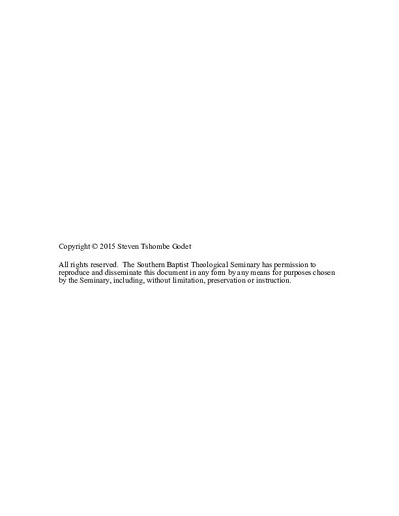The Trinitarian Theology of John Gill (1697-1771): Context, Sources, and Controversy
Abstract
ABSTRACT
THE TRINITARIAN THEOLOGY OF JOHN GILL (1697–1771):
CONTEXT, SOURCES, AND CONTROVERSY
Steven Tshombe Godet, Ph.D.
The Southern Baptist Theological Seminary, 2015
Chair: Dr. Michael A. G. Haykin
In the eighteenth century in Britain, a major controversy arose over the doctrine of the Trinity. This controversy embroiled both the Established Church and Dissenters. One of the champions among the Dissenters was John Gill, a Particular Baptist minister. This dissertation will examine how Gill defended the doctrine of the Trinity against various unorthodox views. Chapter 1 introduces the thesis, history of research, and methodology. Chapter 2 examines the political, cultural, and theological context of John Gill and then surveys his life and works. Chapter 3 examines the trinitarian crisis in two phases: phase 1 (1688–1711) and phase 2 (1712–29). Chapter 4 surveys Gill as a Patristic scholar and analyzes his use of Patristic sources in the debate over the Trinity. Chapter 5–8 introduces Gill’s doctrine of Trinity. Chapter 5 defines Gill’s key trinitarian terms while also considering the importance, revelation, and mystery of the Trinity. Chapter 6 seeks to understand Gill’s defense of the unity of God and plurality of the Godhead. Chapters 7 and 8 examine the distinction of the three persons in the Godhead and the distinct personality and deity of the three persons who are one God. Chapter 9 considers how Gill applied the doctrine of the Trinity to several areas of the Christian life. Chapter 10 summarizes the main arguments and suggests some areas of future study in Gill.

